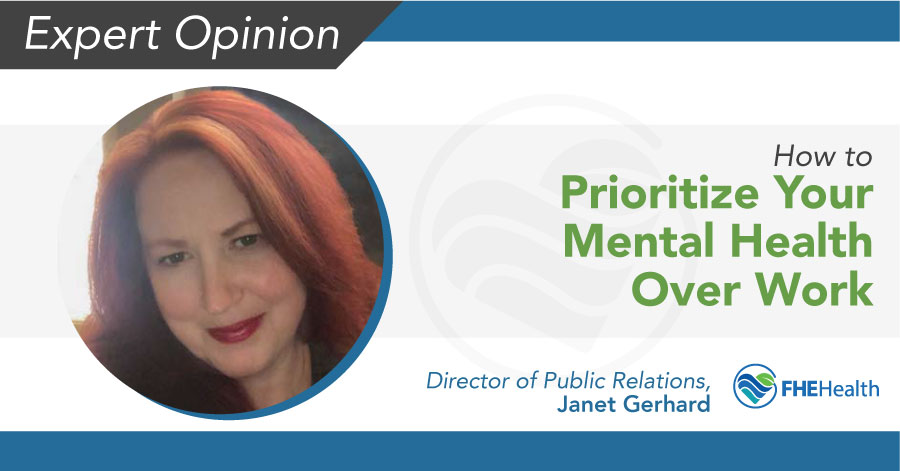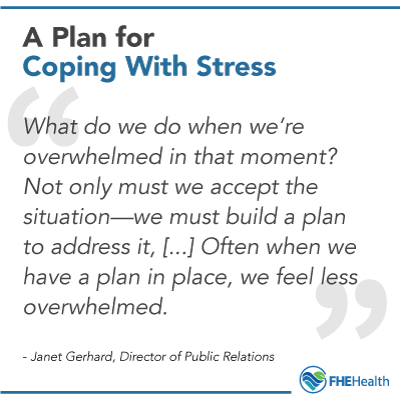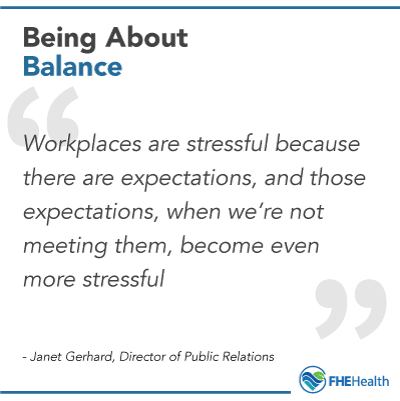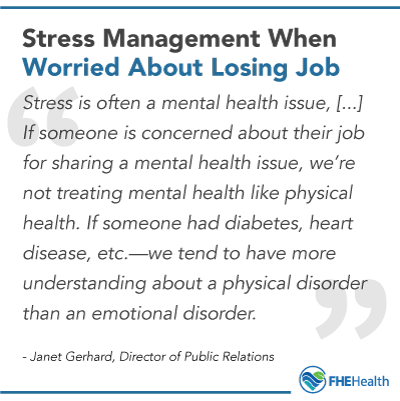
This article has been reviewed for accuracy by our peer review team which includes clinicians and medical professionals. Learn more about our peer review process.
If a global pandemic has taught American workers anything, it is that they matter and that their health and safety are a priority. The “Great Resignation,” a trend in which more Americans have reportedly quit their jobs than at any time since the U.S. Labor Department first began keeping track of employment stats, has only reinforced this lesson. The takeaway? That if there were ever a moment for employees to claim their power and prioritize their mental health over their work, it would be now.
Prioritize Your Mental Health, But How?
But if prioritizing mental health is especially critical now, what does that look like, and how do you do that in your place of work? After all, assessing the stress in one’s life and balancing it with work, job-related pressures, and an employer’s expectations is still hard to do. For many working Americans, it’s not second nature to know how to put one’s mental health first. Employers can seem all-powerful in their claims on time and priorities, even when those claims trigger stress and mental health issues.
FHE Health Director of Public Affairs Janet B. Gerhard has been on the frontlines of these issues as a trusted resource to employees and employers. In a recent interview, she gave some helpful answers to commonly asked questions.
Work-Life Balance and Mental Health – Common Questions Among Working Americans
Pandemic or no pandemic, there will always be the dual challenge of striking a healthy work-life balance and taking care of mental health. That can raise numerous questions and conflicts. For example, what do you do when you feel overwhelmed, yet recognize this is the world we live in? Gerhard advocated the following:
A Change in Mindset for More Work-Life Balance, Mental Health
“A reset of one’s mindset toward Covid and all of the changes and uncertainty that it has introduced is the first step,” Gerhard said. Why? “When you know the lay of the land you can deal with it.” (In other words, don’t just recognize this is the world we live in—accept that we must adjust our perspective.)
“The past two years have introduced huge changes for many of us,” Gerhard said. Her advice? Instead of waiting for Covid to go away, accept it as the new reality. As an illustration that Covid is here to stay, Gerhard cited a recently issued statement from the CDC. It advocated viewing Covid as “just a piece of our world now,” in Gerhard’s paraphrase. She added, “This is chronic illness that doesn’t have an end in sight.”
What this means is that “there’s always a possibility that in the workplace we’ll be at risk of Covid … and, we now have a chronic illness but still must bring in an income and provide for our families financially and emotionally.”
A Plan for Coping with Stress
 “What do we do when we’re overwhelmed in that moment? Not only must we accept the situation—we must build a plan to address it,” Gerhard said. “Often when we have a plan in place, we feel less overwhelmed.”
“What do we do when we’re overwhelmed in that moment? Not only must we accept the situation—we must build a plan to address it,” Gerhard said. “Often when we have a plan in place, we feel less overwhelmed.”
Good time management is a key element of any plan. Here is how Gerhard explained it:
When we manage our time effectively, whether exercise, work projects, or keeping our schedule intact, that can reduce our feelings of being overwhelmed. When I’m not managing my time effectively, I can start to feel overwhelmed with family, deadline, or travel commitments. Also, when we don’t procrastinate, we have better use of time and that can lend more stability and peace of mind.
How to Be About Balance, Mental Health When an Employer Isn’t
Another common question among working Americans: What do you do if you’re struggling to find balance and mental health, and your workplace is unsupportive?
“Workplaces are stressful because there are expectations, and those expectations, when we’re not meeting them, become even more stressful,” Gerhard said. (She noted that it is not uncommon for management to fall short at providing “healthy work environments.”) Even so, self-care starts with the individual, and there are things you can do to reduce your stress:
- Compartmentalize your work. “Our phones keep us tied to our work, because we’re constantly receiving calls and texts, so we need to shut the phone down,” Gerhard said. “We don’t have to be responding to emails at night.”
- Be mindful of stress levels and manage stress. “Stress can be a good motivator, but when it’s an 8 or 9 on a scale of 1-10, it can become anxiety. Anxiety is stress that doesn’t have a break.”
- Learn how to be assertive and say “no.” Gerhard gave the example of a boss introducing a last-minute deadline at the end of the workday. “If your supervisor says they need you to do something by 5pm, you need to be able to say ‘no.’”
- Don’t take on additional responsibilities. “You have a job description, so when you’re being asked to do something outside of the title, manage expectations.”
- Exercise and do those things you enjoy. Being intentional about exercise, reading, and other leisure activities is one way to avoid taking on additional responsibilities, Gerhard said.
Stress Management When You’re Worried About Losing Job?
 What would Gerhard say to the person who is concerned that they could lose their job if they divulge that they’re having stress-related issues?
What would Gerhard say to the person who is concerned that they could lose their job if they divulge that they’re having stress-related issues?
“Stress is often a mental health issue,” Gerhard said. “If someone is concerned about their job for sharing a mental health issue, we’re not treating mental health like physical health. If someone had diabetes, heart disease, etc.—we tend to have more understanding about a physical disorder than an emotional disorder.”
What to Do When a Job Is Causing Too Much Stress?
“Ask yourself how you’re managing your time and give some reflection to how your employer may be part of the solution,” Gerhard advised. “Meet with your direct supervisor and offer some suggestions for how to complete your job effectively while reducing stress.”
Also, take some time for “mindfulness.” Gerhard defined mindfulness as “pressing pause and taking stock, whether you do that through prayer or meditation.” Why? Because it’s important to “be deliberate about what we do and deliberate about not working.” There are “times when we have to say, ‘that’s going to voicemail.’”
Returning to the Office and Anxious About Covid in the Workplace?
 Here again, Gerhard emphasized the importance of being a self-advocate: “Not only are you responsible for your job but you’re the only person to be an advocate for yourself with healthcare.” Gerhard was quick to point out that there are workplace laws that allow reasonable accommodations to be made, such as working from home until Covid cases drop, working in a separate cubicle at work, masking and asking colleagues to do the same, etc.
Here again, Gerhard emphasized the importance of being a self-advocate: “Not only are you responsible for your job but you’re the only person to be an advocate for yourself with healthcare.” Gerhard was quick to point out that there are workplace laws that allow reasonable accommodations to be made, such as working from home until Covid cases drop, working in a separate cubicle at work, masking and asking colleagues to do the same, etc.
“States and counties are offering different resolutions, so you have to develop your own solution,” Gerhard said. “That may be uncomfortable, but no one is a better health advocate for you than you are. Sometimes you may need to change jobs.”
Is stress in your job causing mental health issues? Our team of counselors is here to help. Contact us today.






